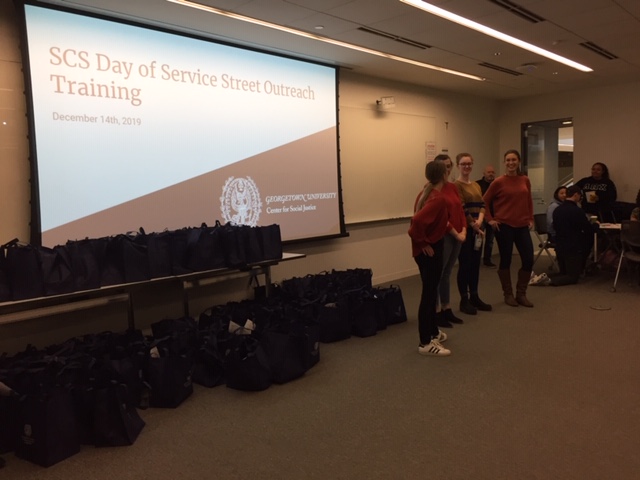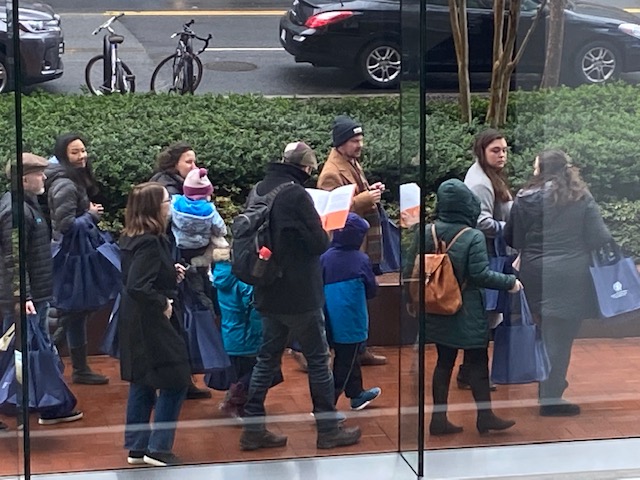Over the last few years, the Fall “Day of Service” at the School of Continuing Studies has become a tradition. The entire school community of faculty, staff, and students is invited to commit to a day of direct service for those in need in Washington, D.C. as a way of putting into practice our Jesuit values of being People for Others and living a Faith that Does Justice. In addition to the good that results for vulnerable persons from these service activities, the occasion of coming together as a school community in the midst of the holidays tends to be festive and enjoyable for participants. One senses a shared gratitude in the room about being together in service for others, alongside friends and family who are all awaiting the much anticipated holiday break. The hours-long convening on a Saturday is also an important moment to pause and acknowledge that the season’s joys and celebrations are not shared by everyone, particularly persons marginalized and excluded in our society who long to be included and dignified.

This year’s Day of Service was especially memorable because it built on the foundation of prior years and also deepened the meaning of the experience. For the first time, the event was co-sponsored by both a student group and a campus partner organization. The Red Cross Group, an association of SCS students committed to providing compassionate care for those in need, promoted the event to fellow students and helped collect materials, like handwarmers and gloves, for preparedness kits for individuals experiencing homelessness to prevent hypothermia. Campus partner, the Center for Social Justice Research, Teaching, and Service (CSJ) co-sponsored the event and provided crucial administrative and educational support. CSJ’s Jesuit Volunteer, Brianna Ledsome, who coordinates Homelessness, Outreach, Meals, and Education programs, prepared information for participants about the reality of homelessness in D.C. and led a training on street outreach during the event. CSJ’s presentation also invited the street outreach teams to reflect on the experience through a series of questions aimed at bringing the deeper personal meaning of the experience and its implications for action to the surface.

More than 50 faculty, staff, and students gathered on December 14 at the SCS campus. The day consisted of multiple activities: assembling preparedness kits from donated materials, preparing sandwiches, writing personalized letters to veterans experiencing homelessness, and distributing kits directly to persons experiencing homelessness in the neighborhood. Despite the cold and rain, most participants ventured out into the neighborhood in groups for the street outreach component of the event. In preparation for distribution, CSJ’s street outreach training provided necessary context for the distribution of kits. Participants learned, based on data from the Community Partnership for Prevention of Homelessness, about the 6,521 homeless persons in the District of Columbia on any given night who are either unsheltered, in emergency shelters, or in transitional housing facilities. Participants also learned how to engage with persons experiencing homelessness in a spirit of mutuality, reverence, and respect. The training was a sobering reminder that homelessness is a social injustice rooted in intersecting social structures like housing, health services, and the economy.

Humanizing the complex issue of homelessness through direct engagement with persons experiencing homelessness while also learning about homelessness as a structural issue of social injustice honors the Jesuit tradition of education. The Jesuit values invite us not only to commit to the work of charity, addressing the immediate needs of vulnerable persons, but also to the work of justice, which requires that we bring to bear intellectual methods of social analysis to better understand how to systematically address realities of poverty and injustice. As former Jesuit Superior General Peter-Hans Kolvenbach made clear in 2000, the commitment to justice that we strive for in Jesuit institutions links personal and social, reflection and action:
Since Saint Ignatius wanted love to be expressed not only in words but also in deeds, the Congregation committed the Society to the promotion of justice as a concrete, radical but proportionate response to an unjustly suffering world. Fostering the virtue of justice in people was not enough. Only a substantive justice can bring about the kinds of structural and attitudinal changes that are needed to uproot those sinful oppressive injustices that are a scandal against humanity and God.
Kolvenbach’s challenging invitation will continue to inspire our learning community. The Day of Service will hopefully have lasting impact at SCS about how to live out, rooted in our Jesuit heritage, a dual commitment to charity and justice in our neighborhood.
